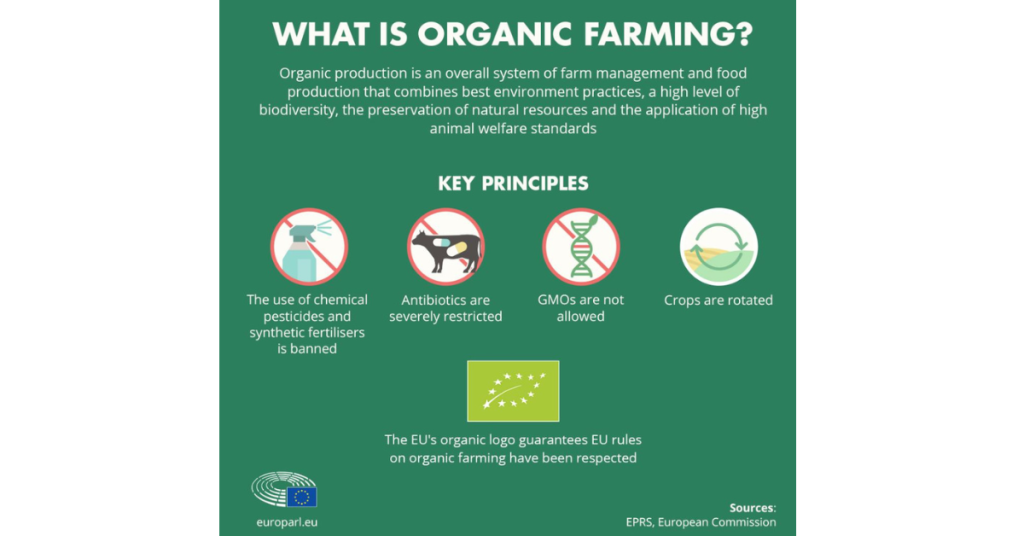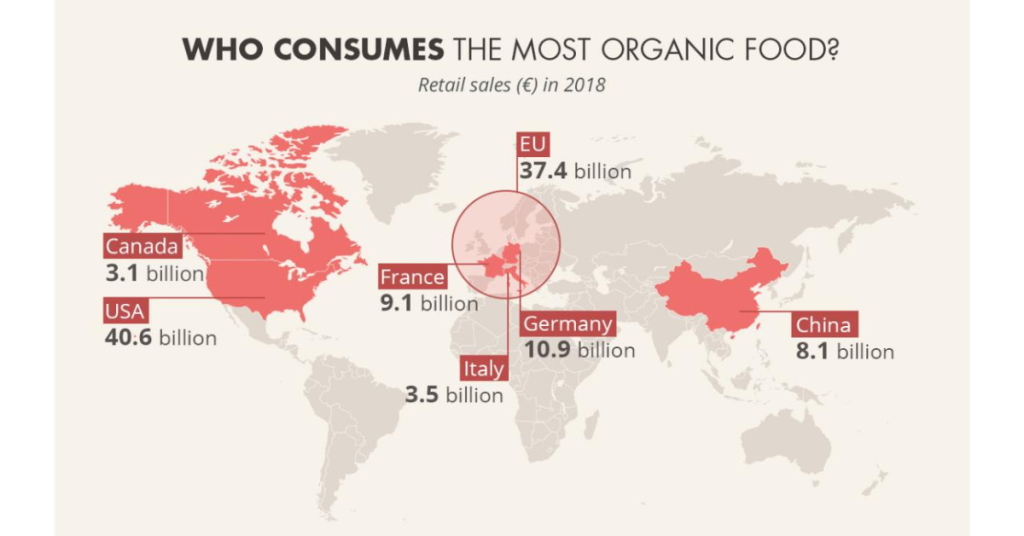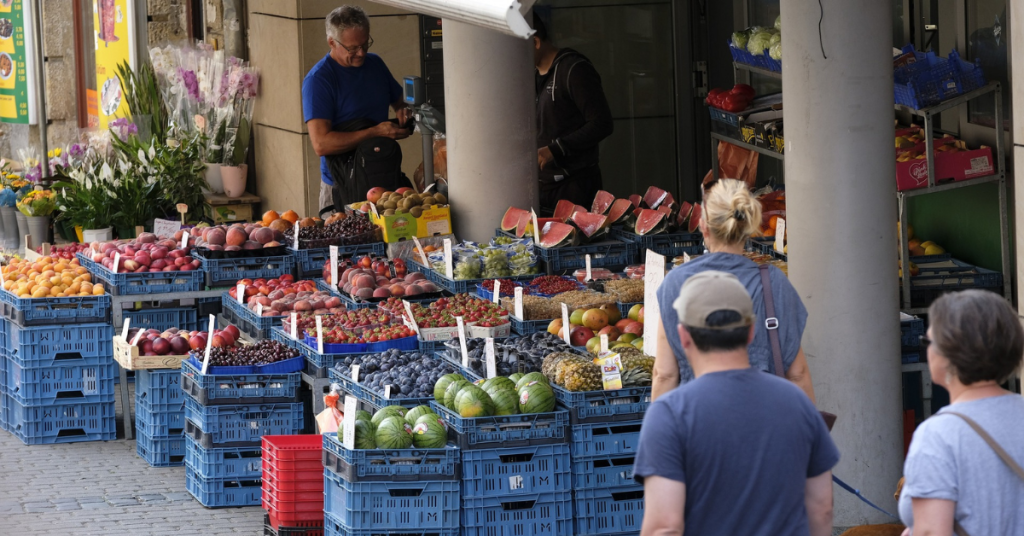- introduction
- Statistical report
- The EU’s organic food market: facts and rules (infographic)
- EU definition of organic farming
- Organic farming practices in the EU
Introduction
In recent years, Europe has witnessed a surge in demand for organic products. This is due to a growing awareness of the environmental and health benefits of organic farming. The organic market in Europe is estimated to reach €92 billion by 2027, with organic food and beverages making up the largest share.
Organic products are those that are produced without the use of synthetic pesticides and fertilizers, genetically modified organisms (GMOs) or other chemical additives. Organic farming is a type of sustainable agriculture, which emphasizes the use of natural inputs, biodiversity and crop rotation, to reduce environmental pollution, build soil fertility and maintain a healthy ecosystem.
While the organic market in Europe is growing, there is still a need to increase awareness of the benefits of organic products among European consumers. This is especially true for younger generations, who often lack the knowledge and understanding of organic farming and its advantages.
In order to promote organic awareness in Europe, various initiatives have been launched. One of the most successful has been the European Union’s (EU) Organic Farming Regulation. This regulation, which came into force in 2021, requires all organic products sold in Europe to meet strict standards for production, labeling and traceability. This ensures that consumers can trust the organic label and that they are getting the best possible quality.
In addition to the EU’s efforts, the European Commission has also taken steps to increase awareness of organic products. For example, the Commission launched the European Organic Action Plan in 2019. This plan sets out a range of measures to support the organic sector, from research and innovation to market development and promotion.
In addition to the EU’s efforts, the European Commission has also taken steps to increase awareness of organic products. For example, the Commission launched the European Organic Action Plan in 2019. This plan sets out a range of measures to support the organic sector, from research and innovation to market development and promotion.
Organic farmers and producers have also taken steps to promote organic products in Europe. Some of these initiatives include creating educational resources about organic farming, such as videos and books, and organizing events and fairs to showcase organic products.
These efforts have been successful in increasing awareness of organic products in Europe. A survey conducted in 2020 found that over 60% of Europeans were aware of organic farming, and that more than half of them had purchased organic products in the last year.
Statistical report
According to a report from Research and Markets, the demand for organic food in Europe is projected to grow at an annual rate of 8.3% from 2019 to 2024. The report attributes the growth in demand to increasing consumer awareness of the health benefits of organic products, as well as rising consumer demand for premium and sustainable foods. The report also notes that Germany and France are the two largest markets for organic products in Europe, and that the dairy, fruits and vegetables, and packaged food categories are the largest contributors to the overall organic food market.
In 2020, the EU’s total area of farmland under organic production grew to 14.9 million hectares. Compared to 2019, the number of organic producers in the EU increased by 1.6% to 349,499. A significant growth of the EU’s organic retail market accompanies this development, marked by a record growth of 15.1%, reaching 44.8 billion EUR, the second largest market, after the USA and followed by China.
The EU’s organic market is very dynamic with growth rates varying between different countries. Its continuous positive development is due to a combination of factors. Besides the innovative character of organic food and farming, growing policy support and European citizens increasing demand for high-quality, sustainable food production, in 2020 and 2021, the COVID-19 pandemic also played a big role. This is well represented in the growing per capita consumption of organic products, which reached 102 EUR on average. Generally speaking, consumers spend more on organic food every year with certain product groups achieving above-average market shares.
In May 2020, the European Commission’s Farm to Fork Strategy mentions organic as a key sector to achieve the European Green Deal’s food ambitions. The strategy states that “The market for organic food is set to continue growing and organic farming needs to be further promoted”. As part of this strategy, the Commission published the 2021-2027 Organic Action Plan, which aims at boosting both organic demand and supply. Measures of the Common Agricultural Policy (CAP) should also be paramount in in reaching “the objective of at least 25% of the EU’s agricultural land under organic farming by 2030 and a significant increase in organic aquaculture”, as laid out in the Farm to Fork Strategy.
It is crucial to link this target to the Common Agricultural Policy (CAP) reform, the Biodiversity Strategy and other agri-food policies to create a more positive environment in which farmers and food companies feel confident making significant investment decisions to meet consumers’ demand for products produced with a heart for people, animals and the planet.
The Farm to Fork strategy foresees that the Commission will put forward a legislative framework on sustainable food systems in 2023. A new comprehensive framework legislation on the sustainability of the Union food system is needed to deliver on the objectives of the Farm to Fork Strategy and to support the transition towards more sustainable food systems based on overarching and encompassing sustainability principles. This legislative proposal, as well as related initiatives such as sustainability labelling, must consider the specificities and benefits of organic practices.
The EU’s organic food market: facts and rules (infographic)
Key facts about organic food and farming in Europe and how new rules will improve the quality further.

New EU rules on organic production will guarantee food quality, environmental protection and animal welfare along the whole supply chain.
EU definition of organic farming
Organic production means a sustainable agricultural system respecting the environment and animal welfare, but also includes all other stages of the food supply chain
The EU regulation on organic production and labelling of organic products ensures that the same high quality standards are respected all over the EU. The rules refer to agriculture and aquaculture farming practices, food processing and labelling, certification procedures for farmers as well as to the import of non-EU organic products.
Organic farmers in the EU use energy and natural resources in a responsible way, promote animal health and contribute to maintaining biodiversity, ecological balance and water/soil quality.
EU organizes organic day to make an overall organic awareness in Europe
Organic farming practices in the EU include
- Crop rotation for an efficient use of resources
- A ban of the use of chemical pesticides and synthetic fertilisers
- Very strict limits on livestock antibiotics
- Ban of genetically modified organisms (GMOs)
- Use of on-site resources for natural fertilisers and animal feed
- Raising livestock in a free-range, open-air environment and the use of organic fodder
- Tailored animal husbandry practices


However, there is still work to be done to increase organic awareness in Europe. In particular, there is a need to educate European consumers about the benefits of organic products, such as their environmental and health benefits. This can be done through targeted campaigns and initiatives, such as social media campaigns and educational programs.
In addition, there is a need to further support the organic sector in Europe, such as through investment in research and innovation and the promotion of organic products. This will help to ensure that organic products remain accessible and affordable for all.
By taking steps to increase awareness of organic products in Europe, consumers will have access to a healthier and more sustainable food system. This will help to reduce environmental pollution, support local farmers and producers, and ensure a healthier future for all.

May I simply just say what a comfort to uncover an individual who actually knows what they are talking about on the internet. You definitely realize how to bring an issue to light and make it important. More and more people have to look at this and understand this side of your story. Its surprising you arent more popular because you surely possess the gift.
Thanks for your comment